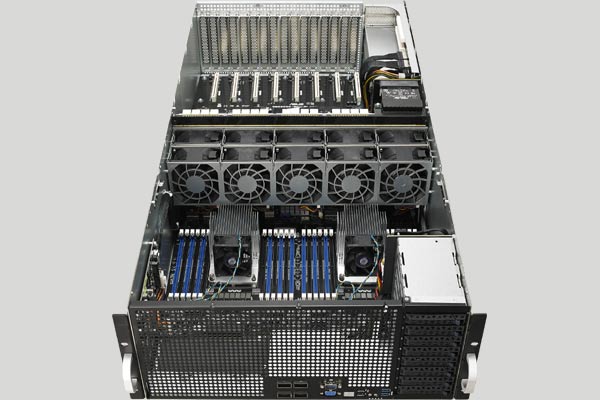
ASUS Sets 246 World Records for Fastest 1P and 2P Server Performance
ASUS announced that a total of 246 world records have been set by its rack servers, including GPGPU (general-purpose computing on graphics processing units) servers and multi-node servers. As recorded by the Standard Performance Evaluation Corporation (SPEC) for benchmarks measuring computing-intensive performance, ASUS dual-processor (2P) servers ESC8000 G4 and RS720Q-E9 achieved the highest scores for compute-intensive applications, and the ASUS single-processor (1P) RS300-E10 server set70 new best-performance records. Each of the new, record-breaking configurable ASUS servers are designed to be highly scalable and to work seamlessly for infrastructure visualization, data analysis, AI training workloads orany general computing applications.
ASUS GPGPU server ESC8000 G4 achieves the world’s best performance
ESC8000 G4 is a4U GPGPU series 2P server with support for up to eight double-deck graphics cards for AI training, high-performance computing (HPC), content creation, rendering, gaming, VR and AR, and professional visualization applications. Its patented adaptable topology design allows it to automatically switch to single- or dual-root topologies through ASMB9-iKVM, making it ideal for AI learning or High Performance Computing environments. ESC8000 G4 holds 64 world records for compute-intensive applications across SPEC CPU® 2017 benchmark packages SPECint 2017 rate and SPECfp 2017.
RS720Q-E9,a 2U4N high-density 2P server, set a record of 97 benchmarks for compute-intensive applications across SPEC CPU® 2017 benchmarks packages SPECint 2017 rate and SPECfp 2017. RS720Q-E9 is designed for processing-intensive environments such as data center and private cloud applications. It supports two to eight processors (28 cores per processor) and 48 DIMMs for up to 6TB of memory.
All ASUS servers that achieve the world-record 2P performance results are based on 1st and 2nd Generation Intel® Xeon® scalable processors.
ASUS servers set 246 performance benchmark world records
ASUS has over 23 years of expertise in the server industry and a dedicated team of engineers specializing in server hardware design, software/firmware integration, and performance tuning and optimization for a broad range of applications. The record-setting performance of these new ASUS servers underscores the ASUS commitment to pursuing continuous system optimization and performance tuning to deliver solutions of the highest quality. As of August 1, 2019, ASUS servers have set 246 performance benchmark records.
ASUS 1P server sets 70performance benchmark world records
RS300-E10, a 1U 1P server with up to four Ethernet LAN ports, storage expansions and ASUS-exclusive Performance Boost technology,set 70 world records across SPEC CPU® 2017 benchmark packages SPECint 2017 and SPECfp 2017. The Intel® Xeon® Eprocessor at the heart of the RS300-E10 delivers up to 1.36X higher performance,versus the previous generation.The combination of two additional cores and higher single-core turbo frequency increases performance across workstation benchmarks as compared with previous 4-core entry workstation processors.The short-depth chassis design of the RS300-E10 is the perfect space-saving solution for small or medium-sized businesses.Based on the Intel® Xeon® E processor family, it offers robust computing power for file servers, customer service servers, gateways or other specific applications.
Performance Boost tuning technology
ASUS servers feature exclusive Performance Boost technology to achieve the best server performance and agility by tuning servers to match workload requirements. This technology improves workload throughput by maximizing processor frequency and boost power, making it ideal for time-sensitive applications such as financial services or data center operations. In the BIOS, customers can choose from pre-configured server profiles optimized for specific workloads, maximizing overall performance and reducing server-configuration time.
